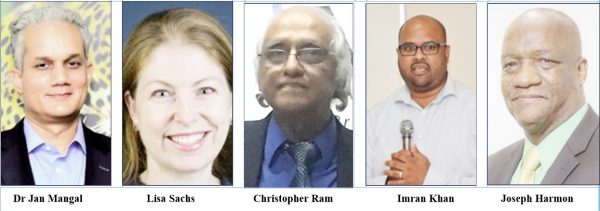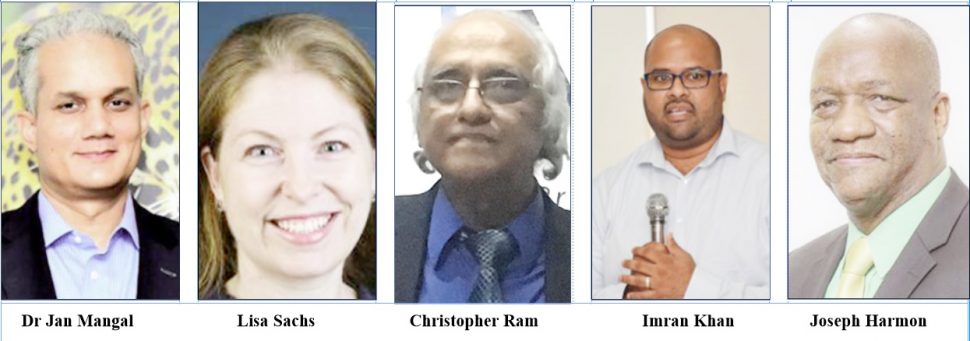Following searing criticism by former Advisor on Petroleum, Dr Jan Mangal that the government is unwilling to invest enough now on training and hiring of experts, Minister of State Joseph Harmon says such assertions are wrong and the administration is continuing to build capacity.
“We need people on the ground working there on long-term contracts, at least a year or two. We need to spend US$10M now and save US$1B in the future and the government is unwilling to spend the US$10M now and save the US$1B in the future,” Mangal said, last week, on the Qatar-owned Al Jazeera Media Network’s production ‘The Stream’.
He was a guest on a panel comprising government’s representative and Director of Public Information, Imran Khan; chartered accountant and attorney-at-law Christopher Ram and Director of the Columbia Centre on Sustainable Investment, Lisa Sachs which examined Guyana’s recent oil discovery, under the theme- Guyana: Will its oil boom benefit the people?
The Minister of State, who said he watched the broadcast in its entirety, said he was flabbergasted by Mangal’s assertions and denied that his government was not investing in putting mechanisms in place for 2020’s first oil, which includes hiring international experts.
Evidence of government’s investing in the sector, Harmon said, could be seen from a recent US$20M that has been borrowed from the World Bank to build capacity for the oil and gas sector.
“I don’t know where Dr. Mangal has his information from, and he may have access to information that I don’t have, but certainly, as far as I know as regards to the government, there has been no decision that we don’t want to invest money or we are not going to do this or that. I thought that was a little bit of information that he provided that certainly is not the case,” Harmon told Stabroek News following the show.
“Government is building capacity, is going to use the funds from the World Bank. We don’t have everything now and we are getting help, getting assistance, as Imran Khan said on the programme, and we are accepting those assistance. The fact that you don’t have somebody here fulltime is a statement, to me, that should not have been made. Every country didn’t have everything they wanted when they started but they built that capacity. In some cases they were able to hire people and that is what we will be doing as well. We will be hiring the people that we need to fill these positions. In the meantime, we are getting assistance from the international financial institutions, the Commonwealth Secretariat and these places and are taking it,” he added.
Oversight measures
On the broadcast, the Director of Public Information boasted that government was taking the right steps in putting oversight measures in place and has had consultations with world- renowned experts such as Sir Paul Collier.
 “We’ve had difficult times since independence. We hope that this transformational oil find will correct some of the issues and challenges that we’ve had in the past… We are very cautious and that has brought some criticisms, with regards to the pace at which we’re implementing legislation and putting structures and framework in place. But we want to ensure we do it correctly; we do it right…and will ensure this opportunity is not squandered“, Khan said.
“We’ve had difficult times since independence. We hope that this transformational oil find will correct some of the issues and challenges that we’ve had in the past… We are very cautious and that has brought some criticisms, with regards to the pace at which we’re implementing legislation and putting structures and framework in place. But we want to ensure we do it correctly; we do it right…and will ensure this opportunity is not squandered“, Khan said.
“We have had experts. We have had internationally recognized expert Sir Paul Collier who has been in Guyana and has briefed the president…,” he added while making reference to other persons who government had invited as part of a one-day caucus, earlier this year.
Sporadically
But Mangal pointed out that experts sporadically visiting would not meet the capacity that is needed in this country, to effectively map out a strategy and put experienced personnel in the relevant oversight positions. “What Imran says there is all good words but when you look on the ground, it is a different story. Imran mentioned the need for experts but actually there are consultants coming and going but there is zero oil and gas experts working. Unfortunately, there seems to be a reluctance in hiring the required capacity and that is unfortunate,” Mangal asserted.
“These names are being thrown out, and that is what the government is very good at -just throwing these names around. Where is the substance? Having a trip for one day is insufficient,” he added.
Ram, who writes a column on oil and gas in this newspaper, said that not only is there a human resource deficit here but advice given by civil society to the current government falls on deaf ears.
“Civil society did not have a role in the type of contract. At present, we have no policy framework, no legislative framework, [and] no institutional framework; we have no policy in relation to consumption and saving; we have a serious physical and social deficit,” he stressed.
“I may talk but I never get listened to by those in the corridors of power,” he added Ram said that the government bandies about that it has prepared for a Sovereign Wealth Fund and is saving for the future but fails to say what are its immediate, short and long-term plans for development. “We can’t use only for future generations what about the current generation? We have to consider where our absorptive capacity is”, he stated.
For her part, Sachs, who has worked in East Timor and adverted to similarities shared with Guyana, pointed to two distinct components that should be addressed. The first, she said, is getting the skills and being able to manage the sector and negotiate with the international players and the other is constructing a long-term development strategy.
Sachs believes that the focus at this time should not be on jobs to be had from the oil and gas sector as the companies have already said they are minimal.
“The benefits for the country are on the development side and I don’t think the country should rely on the minimal number of the jobs ….What the country needs to be putting in place now is a long-term development strategy.
How does this oil boom fit into the long-term development strategy, plans and needs of Guyana? How will this help build health systems, energy systems, educational systems. Infrastructural systems…,” she said.
But while Mangal chastised government for not investing in its human resources, he praised President David Granger for the vision he has for this country and his understanding of the risks associated with an oil and gas economy.
“His vision is all around … His vision is that this is for the children and grandchildren of Guyana. So he has a very solid vision for the country. It is just in implanting that vision that we are seeing some stumbling blocks.
“We have to understand that it is a coalition government and the politics involved …Guyanese think the president can make everything happen but the president can’t …and that is where Guyanese need to step in, well, civil society and strong institutions and that is what we don’t have,” he added.
Mangal believes that “the odds are stacked against Guyana” and a lot of work is needed. He said this country’s citizenry and its leaders need to recognize what are the risks involved and “Exxon is not here to help Guyana, Exxon is here to make money”. As such, he is urging government to swiftly address its shortcomings.
Harmon assured that government will do what is necessary to have not only a thriving oil and gas sector but that revenues earned from it will be put to the benefit of all of Guyana.
He echoed most of what Khan said on the programme that the populace should not be anxious or have fear that Guyana would not be ready to cope come first oil.
“The Department of Energy is being set up and when it is, we will have international experts with experience and we will have the best minds locally. It is an anxiety that the government has as well but we want to ensure that when the structures are set up, they are set up properly and with the best international advice,” Khan had said.
“We will be hiring the people that we need to fill these vacancies. In the meantime, we are getting assistance from the international financial institutions- the Commonwealth Secretariat and these places. We certainly don’t have everything but clearly it is a work in progress. And, we are going to hire people that we need until such time that we can build local capacity. We will look and wherever the skills reside we will go and get it,” Harmon said. “We will get this right,” he added.





